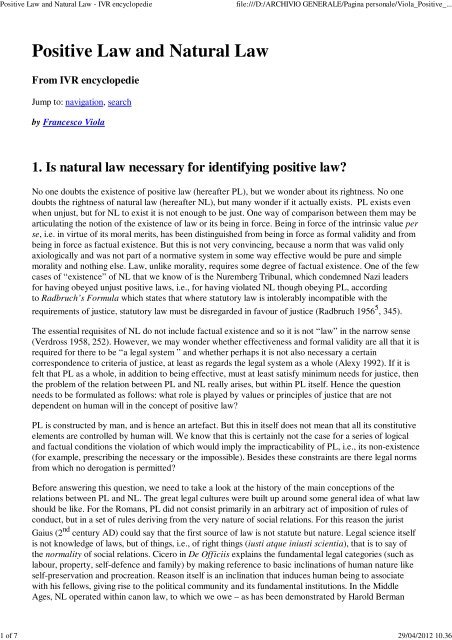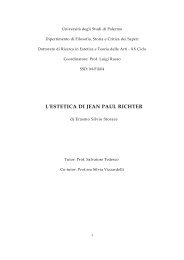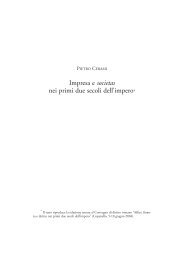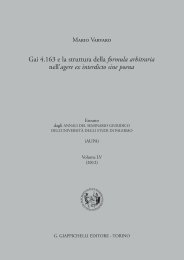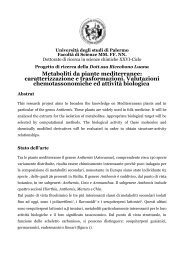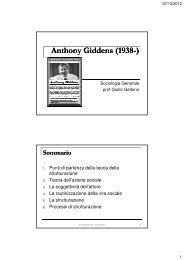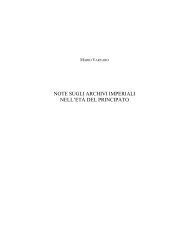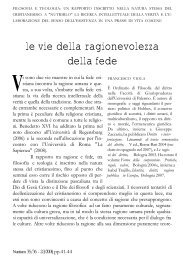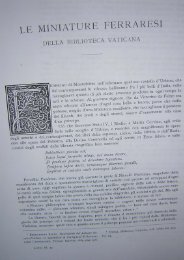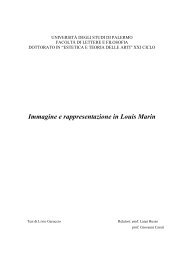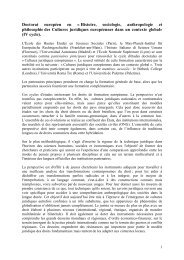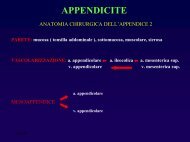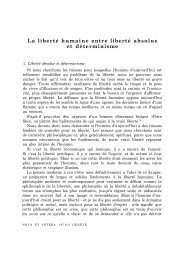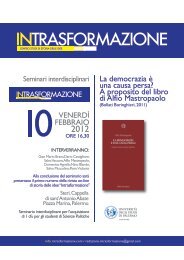Positive Law and Natural Law - IVR encyclopedie
Positive Law and Natural Law - IVR encyclopedie
Positive Law and Natural Law - IVR encyclopedie
Create successful ePaper yourself
Turn your PDF publications into a flip-book with our unique Google optimized e-Paper software.
<strong>Positive</strong> <strong>Law</strong> <strong>and</strong> <strong>Natural</strong> <strong>Law</strong> - <strong>IVR</strong> <strong>encyclopedie</strong><br />
file:///D:/ARCHIVIO GENERALE/Pagina personale/Viola_<strong>Positive</strong>_...<br />
<strong>Positive</strong> <strong>Law</strong> <strong>and</strong> <strong>Natural</strong> <strong>Law</strong><br />
From <strong>IVR</strong> <strong>encyclopedie</strong><br />
Jump to: navigation, search<br />
by Francesco Viola<br />
1. Is natural law necessary for identifying positive law?<br />
No one doubts the existence of positive law (hereafter PL), but we wonder about its rightness. No one<br />
doubts the rightness of natural law (hereafter NL), but many wonder if it actually exists. PL exists even<br />
when unjust, but for NL to exist it is not enough to be just. One way of comparison between them may be<br />
articulating the notion of the existence of law or its being in force. Being in force of the intrinsic value per<br />
se, i.e. in virtue of its moral merits, has been distinguished from being in force as formal validity <strong>and</strong> from<br />
being in force as factual existence. But this is not very convincing, because a norm that was valid only<br />
axiologically <strong>and</strong> was not part of a normative system in some way effective would be pure <strong>and</strong> simple<br />
morality <strong>and</strong> nothing else. <strong>Law</strong>, unlike morality, requires some degree of factual existence. One of the few<br />
cases of “existence” of NL that we know of is the Nuremberg Tribunal, which condemned Nazi leaders<br />
for having obeyed unjust positive laws, i.e., for having violated NL though obeying PL, according<br />
to Radbruch’s Formula which states that where statutory law is intolerably incompatible with the<br />
requirements of justice, statutory law must be disregarded in favour of justice (Radbruch 1956 5 , 345).<br />
The essential requisites of NL do not include factual existence <strong>and</strong> so it is not “law” in the narrow sense<br />
(Verdross 1958, 252). However, we may wonder whether effectiveness <strong>and</strong> formal validity are all that it is<br />
required for there to be “a legal system ” <strong>and</strong> whether perhaps it is not also necessary a certain<br />
correspondence to criteria of justice, at least as regards the legal system as a whole (Alexy 1992). If it is<br />
felt that PL as a whole, in addition to being effective, must at least satisfy minimum needs for justice, then<br />
the problem of the relation between PL <strong>and</strong> NL really arises, but within PL itself. Hence the question<br />
needs to be formulated as follows: what role is played by values or principles of justice that are not<br />
dependent on human will in the concept of positive law?<br />
PL is constructed by man, <strong>and</strong> is hence an artefact. But this in itself does not mean that all its constitutive<br />
elements are controlled by human will. We know that this is certainly not the case for a series of logical<br />
<strong>and</strong> factual conditions the violation of which would imply the impracticability of PL, i.e., its non-existence<br />
(for example, prescribing the necessary or the impossible). Besides these constraints are there legal norms<br />
from which no derogation is permitted?<br />
Before answering this question, we need to take a look at the history of the main conceptions of the<br />
relations between PL <strong>and</strong> NL. The great legal cultures were built up around some general idea of what law<br />
should be like. For the Romans, PL did not consist primarily in an arbitrary act of imposition of rules of<br />
conduct, but in a set of rules deriving from the very nature of social relations. For this reason the jurist<br />
Gaius (2 nd century AD) could say that the first source of law is not statute but nature. Legal science itself<br />
is not knowledge of laws, but of things, i.e., of right things (iusti atque iniusti scientia), that is to say of<br />
the normality of social relations. Cicero in De Officiis explains the fundamental legal categories (such as<br />
labour, property, self-defence <strong>and</strong> family) by making reference to basic inclinations of human nature like<br />
self-preservation <strong>and</strong> procreation. Reason itself is an inclination that induces human being to associate<br />
with his fellows, giving rise to the political community <strong>and</strong> its fundamental institutions. In the Middle<br />
Ages, NL operated within canon law, to which we owe – as has been demonstrated by Harold Berman<br />
1 of 7 29/04/2012 10.36
<strong>Positive</strong> <strong>Law</strong> <strong>and</strong> <strong>Natural</strong> <strong>Law</strong> - <strong>IVR</strong> <strong>encyclopedie</strong><br />
file:///D:/ARCHIVIO GENERALE/Pagina personale/Viola_<strong>Positive</strong>_...<br />
2 of 7 29/04/2012 10.36<br />
(1983) <strong>and</strong> Brian Tierney (1997) – the importance of intention, consensus <strong>and</strong> individual will in contract<br />
law, marriage law <strong>and</strong> penal law, the first affirmation of natural rights. Moreover, the influence exerted by<br />
the rationalism of the Enlightenment on the codification process deserve mentioning. Lastly, how can we<br />
not recognise the enormous influence of the natural rights on the Universal Declaration of Human<br />
Rights (1948) <strong>and</strong>, through it, on the constitutional law of contemporary states <strong>and</strong> on general<br />
international law?<br />
These are only a few of the many examples of how “in fact” an idea of NL has influenced a general<br />
underst<strong>and</strong>ing of PL <strong>and</strong> its contents. However, the fact that a conception of NL has inspired a PL culture<br />
does not mean that NL itself is relevant for a PL system. Indeed, we may think that this is the role <strong>and</strong> the<br />
task that the meta-legal has always had in the formation of legal rules. And so we have to go back to the<br />
main question: is reference to moral <strong>and</strong> political values an essential element for identifying positive law?<br />
2. Three faces of the relationship between positive <strong>and</strong> natural law<br />
We can only answer a question like the one just raised by appealing to a theory of PL <strong>and</strong> at the same<br />
time to a conception of NL (Bix 2002). In the normative sphere the problem of the relationship between<br />
PL <strong>and</strong> NL becomes inseparably mixed up with the problem of the relationship between a conception of<br />
one <strong>and</strong> a conception of the other (e.g., Covell 1992). Since the ways of conceiving the positivity <strong>and</strong><br />
naturalness of law are multiple, we will have different conceptions of the relations between them. Here<br />
the issue must be looked at from the point of view of the positivity of law (e.g., Zaccaria 1991).<br />
The relevance of NL might be detected within three main profiles of legal theory: the foundation of the<br />
obligation to obey legal rules, the content of legal rules, <strong>and</strong> the form of legal rules themselves. For each<br />
of these three points we can ask ourselves whether we need to have recourse to NL.<br />
2.1. Why do we have to obey the law?<br />
Legal positivism rejects the idea that the legal bindingness can be essentially or necessarily based on<br />
moral values or on principles of justice, one reason being that, since value judgments are controvertible,<br />
the certainty <strong>and</strong> autonomy of law would be lost. In order to ascertain the existence of law, it is necessary<br />
to describe it in terms that are purely factual, empirical, based on the observation <strong>and</strong> interpretation of<br />
social facts. This rules out the possibility of it being ultimately legitimate to have recourse to natural<br />
morality. Consequently, we have to separate the concept of validity seen as existence of law from the<br />
moral duty to obey its rules (Ross 1961). But if the identification of law does not serve to create a<br />
foundation for a truebindingness, then legal theory loses part of its importance <strong>and</strong> moral theory (or NL<br />
doctrine) becomes more attractive for law (Cotta 1983). Precisely in order to avoid this outcome, Kelsen<br />
identified the existence <strong>and</strong> validity of a norm with its binding force, its strong obligatoriness, i.e., with the<br />
obligation to behave as it prescribes (Kelsen 1945, p. 30). In this way, the legal system takes on a moral<br />
quality, one that is not empirical even though not one linked to NL. Kelsen’s intention is to confer on legal<br />
theory itself the normative advantages of the NL doctrine, stripping it of its metaphysical <strong>and</strong> axiological<br />
contents. This appears to be necessary since no normativity can be deduced from empirical facts. The<br />
result is a concept of legal duty which is of the same genus of the moral one. In this we can still see a<br />
certain presence of NL within PL, i.e., the idea of bindingness that is proper to NL doctrine is preserved<br />
without its recourse to substantial moral values. For this reason, together with the need not to move away<br />
from empiricism, contemporary theory of legal positivism has gone the way of conventionalism (Green<br />
1999).<br />
A settled doctrine, which started from the ideas of Hart, maintains that “there are conventional rules of<br />
recognition, namely, conventions which determine certain facts or events that are taken to yield<br />
established ways for the creation, modification, <strong>and</strong> annulment of legal st<strong>and</strong>ards” (Marmor 2002, 104).<br />
Hence positivity indicates reference to certain facts that in turn are determined by conventional rules<br />
regulating the identification <strong>and</strong> exercise of authority. Therefore the central point in this concept of<br />
positivity lies in the nature of these conventional rules of recognition. How are they related to NL?
<strong>Positive</strong> <strong>Law</strong> <strong>and</strong> <strong>Natural</strong> <strong>Law</strong> - <strong>IVR</strong> <strong>encyclopedie</strong><br />
file:///D:/ARCHIVIO GENERALE/Pagina personale/Viola_<strong>Positive</strong>_...<br />
3 of 7 29/04/2012 10.36<br />
These conventions constitute the practice at issue. This means that there exists no law prior to the legal<br />
practice made up of the recognition’s conventions (practice theory of norms). This rules out any law<br />
existing prior to PL <strong>and</strong> hence also any “NL”, but it does not yet rule out the possibility of NL being<br />
present within legal practice itself.<br />
For this to be ruled out, it must be felt that the normativity of law is only grounded in the fact that all<br />
participants in the practice consider the rule a reason for acting. As it is well known, this was contested by<br />
Ronald Dworkin (1977), when he maintained that judicial decisions also have recourse to principles of<br />
critical morality connected in some way to institutional traditions. The argument (Marmor 2002, p. 108)<br />
whereby legal conventions cannot provide reasons for acting that are different from the ones internal to<br />
legal practice itself does not rule out the possibility of law also being identified on the basis of moral <strong>and</strong><br />
political considerations, since it is always possible that these are reasons internal to PL, as Dworkin <strong>and</strong><br />
inclusive legal positivists maintain, though in a different sense (Himma 2002).<br />
Another conventionalist argument against NL is the following: if one were to obey the authority for other<br />
reasons than those that depend on the authority itself, then this would be superfluous (Raz 1994). This<br />
rules out the idea of reference to moral values being an essential (<strong>and</strong> contingent too) element for<br />
identification of law. However, this argument depends on the role that is assigned to the legal authority,<br />
which can have a creative or productive task <strong>and</strong>/or an interpretative task. The latter binds the authority<br />
to showing that its interpretation of the fundamental values is correct even if it is not the best. This<br />
justification implies that the reasons why a norm is issued become part of the essential characteristics of<br />
the PL together with the element of formal validity. Here too one can recognise a certain presence of NL.<br />
In conclusion, one can doubt whether the conventionalist perspective, with recourse to the use <strong>and</strong> beliefs<br />
of all participants in the practice, succeeds in grounding the bindingness of the legal rule better than the<br />
normative theory, which sees independent reasons for acting in the legal undertaking itself. Contemporary<br />
legal theory is marked by a debate on the underst<strong>and</strong>ing of the social practice that law consists in (e.g.,<br />
Coleman 1989). While the conventionalist nature of legal rules is not denied, the fundamental issue<br />
concerns the way of seeing the forms of good inside a social practice, i.e., establishing whether these are<br />
essential goals or fundamental values that must in some way be guaranteed for human beings (Finnis<br />
1980, 3) or whether they are merely contingent <strong>and</strong> conventional themselves. Only in the first case could<br />
conventionalism be reconciled to some extent with NL, i.e., satisfy the dem<strong>and</strong> for a “natural” function in<br />
law.<br />
2.2. The content of the legal rule <strong>and</strong> natural law<br />
The second question is whether it is a necessary condition for being PL that a norm is consistent with NL.<br />
Obviously it is not an issue of fact but a normative one, i.e., one needs to know whether a valid PL can in<br />
principle have any content – this was the opinion of Kelsen, who in the formal good of peace saw the only<br />
general aim of law (Kelsen 1945, 13-14) – or whether there are ethical limits to contents. Jurists in the<br />
past admitted that law requires an “ethical minimum”, seen by some rather as a positive morality (e.g.,<br />
Jellinek 1878, 42 ff., 56-57) <strong>and</strong> by others as a natural morality (Cathrein 1909 2 , 61). More recently it has<br />
been stated that law necessarily makes a “claim to correctness” (Alexy 1989). However, the doctrine that<br />
legal norms can have any content, even the most unjust <strong>and</strong> the most seriously offensive for human<br />
dignity, is also unacceptable for many legal positivists. Hart’s doctrine of “the minimum content of natural<br />
law” is also one famous indication of this orientation. “Reflection on some very obvious generalizations –<br />
indeed truisms – concerning human nature <strong>and</strong> the world in which men live, shows that as long as these<br />
hold good, there are certain rules of conduct which any social organization must contain if it is to be<br />
viable. Such rules do in fact constitute a common element in the law <strong>and</strong> conventional morality of all<br />
societies which have progressed to the point where these are distinguished as different forms of social<br />
control” (Hart 1994 2 , 192-3). Here we are clearly not talking about positive morality but natural morality.<br />
It is not a simple observation of what actually happens in legal systems, but is a description of what must<br />
be expected, given certain conditions. According to Hart, these bound normative conditions are functional<br />
to the attainment of the general aim of survival, which is seen as the reason why certain prohibitions <strong>and</strong>
<strong>Positive</strong> <strong>Law</strong> <strong>and</strong> <strong>Natural</strong> <strong>Law</strong> - <strong>IVR</strong> <strong>encyclopedie</strong><br />
file:///D:/ARCHIVIO GENERALE/Pagina personale/Viola_<strong>Positive</strong>_...<br />
4 of 7 29/04/2012 10.36<br />
obligations <strong>and</strong> certain legal institutions are present in some way in all legal systems. The difference<br />
between survival <strong>and</strong> peace, both Hobbesian <strong>and</strong> Humean aims, consists in the fact that the former<br />
appeals to a conception of human nature as it is in the present conditions of existence, while the latter<br />
does without this, deeming that the only evil that law wants to avoid is the illegitimate use of force. The<br />
NL doctrine of “commonsense” accepted by Hart is very restricted compared to the traditional one, both<br />
because like the modern one it regards only the means (Haakonssen 1996) <strong>and</strong> because it deems that the<br />
common aim is only survival. Precisely on the latter point there is a debate going on in contemporary<br />
political <strong>and</strong> legal philosophy between a “thick” conception of fundamental values, like for example that<br />
of Finnis, <strong>and</strong> a “thin” conception of primary goods, like for example that of Rawls.<br />
Moreover, if we consider law as a social practice of an interpretative type <strong>and</strong> not just a set of rules, then<br />
NL can be present in the judicial process insofar as the judge – as Dworkin believes – has the legal <strong>and</strong><br />
moral obligation to include in the interpretation <strong>and</strong> argumentation principles <strong>and</strong> norms that are<br />
applicable not because they are legally valid but because they are morally right or fair.<br />
Another interesting locus is that of international law, in which the notion of jus cogens has developed<br />
(Kolb 2001). At the 1969 Vienna Convention on the <strong>Law</strong> of Treaties (art. 53), reference was made for the<br />
first time to imperative <strong>and</strong> peremptory norms (Verdross 1966), the violation of which is a specific cause<br />
making treaties void. These norms, which cannot be derogated, protect some values that are essential for<br />
peaceful coexistence in the International Community. The International <strong>Law</strong> Commission identified them<br />
in the norms forbidding aggression, colonialism, slavery, genocide, apartheid <strong>and</strong> massive pollution of the<br />
atmosphere <strong>and</strong> the seas (Parker 1988-89). This can be considered as a specific form of jus gentium in our<br />
time, i. e. a legalisation of NL principles.<br />
2.3. The form of the legal rule <strong>and</strong> natural law<br />
The third <strong>and</strong> last issue is whether the fact that legal rules must have a given form <strong>and</strong> not another <strong>and</strong> the<br />
fact that the legal system as a whole must have a given structure <strong>and</strong> not another are not a sign of NL<br />
constraints. Is not the form of legality itself a moral value? (MacCormick 1992). The theory of the rule of<br />
lawis traditionally linked to the essential characteristics that a legal norm must have: publicity, generality,<br />
non-retroactivity, clarity, consistency, constancy through time, practicability <strong>and</strong> congruity in application<br />
<strong>and</strong> so on (Fuller 1964). All these conditions are formal in broad sense, but they must be these <strong>and</strong> no<br />
others for the law to perform tasks referring to substantial objectives or values like respect for liberty,<br />
equality <strong>and</strong> people’s expectations. While all agree in principle on the way to describe the elements<br />
of rule of law, there is major disagreement on the identification of these objectives or these values (Craig<br />
1997, Marmor 2004). Even a “formal” conception has to justify itself in some way <strong>and</strong> this should be a<br />
“substantial” way. As confirmation of this, Kelsen consequently expunges the theory of rule of law from<br />
the pure theory of law, i.e., from the object of legal science, considering it as a prejudice linked to NL.<br />
Hart deems it a necessary but not a sufficient condition for justice, in that it is “compatible with very great<br />
iniquity” (Hart 1994 2 , 207). Nonetheless, there are marked analogies between Hart’s “principles of<br />
natural justice” <strong>and</strong> Fuller’s “internal morality of law”. The procedural dimension of law presupposes a<br />
liberal view of human being, in that it is based on the presupposition that the human being is capable of<br />
self-determination, of underst<strong>and</strong>ing <strong>and</strong> following norms <strong>and</strong> making up for their defects (Fuller 1964,<br />
162). For this reason law is a purposive human undertaking. Hence – according to Fuller - there is a<br />
“morality” of procedures dictated by their internal reason for existing <strong>and</strong> the general aims for which they<br />
are made. That a public body must not perform acts ultra vires, i.e., beyond its own competences, is<br />
undoubtedly a moral procedural principle, <strong>and</strong> that the freedom of citizens must not be threatened by<br />
arbitrary acts by public powers is a substantial moral principle. These internal <strong>and</strong> external constraints of<br />
procedures have appropriately been configured as “a natural law of institutions <strong>and</strong> procedures” (Fuller<br />
1981, 32). This means that the content of PL, at least in its procedural part, is neither arbitrary nor<br />
ethically irrelevant. Lastly, if we consider the nature of the obligation of functionaries in relation to these<br />
secondary rules, we have to recognise that they are closer to the moral ones than to the strictly legal ones,<br />
since they are founded on the principle of fidelity to law seen as a cooperative undertaking whose internal<br />
good is that of attaining justice in the best possible way with the legal materials available.
<strong>Positive</strong> <strong>Law</strong> <strong>and</strong> <strong>Natural</strong> <strong>Law</strong> - <strong>IVR</strong> <strong>encyclopedie</strong><br />
file:///D:/ARCHIVIO GENERALE/Pagina personale/Viola_<strong>Positive</strong>_...<br />
5 of 7 29/04/2012 10.36<br />
Related entries<br />
Authority, Binding force of the law, Convention, Conventionalism in the law, Ronald Dworkin, John<br />
Finnis, Lon Fuller, H.L.A. Hart, Ideals in the law, Justice, <strong>Law</strong> <strong>and</strong> Morality, Legal Positivism,<br />
<strong>Natural</strong> <strong>Law</strong>, Normativity, Obligation to obey the law, Positivity <strong>and</strong> validity, Rule of law, Valid law,<br />
validity, Values in the law.<br />
References<br />
Alexy, R. - 1989, “On Necessary Relations between <strong>Law</strong> <strong>and</strong> Morality”, Ratio juris, 2: pp. 167-183.<br />
- 1992, Begriff und Geltung des Rechts, Freiburg i. B.: Verlag Karl Alber.<br />
Berman, H.J. , 1983, The Formation of the Western Legal Tradition, Cambridge, Mass.: Harvard U. P.<br />
Bix, B. 2002, “NL: The Modern Tradition”, in J. Coleman-S. Shapiro (eds.), The Oxford H<strong>and</strong>book of<br />
Jurisprudence <strong>and</strong> Philosophy of <strong>Law</strong>, Oxford: Oxford U. P., pp. 61-103.<br />
Cathrein, V. 1909 2 , Recht, Naturrecht und positives Recht, Freiburg i. Br, reprinted Darmstadt:<br />
Wissenschaftliche Buchgesellschaft 1964.<br />
Coleman, J.L. 1989, “On the Relationship Between <strong>Law</strong> <strong>and</strong> Morality”, Ratio juris, 2: pp. 66-78.<br />
Cotta, S. 1983, “PL <strong>and</strong> NL”, Review of Metaphysics, 37: pp. 265-285.<br />
Covell, Ch. 1992, The Defence of NL. A Study of the Ideas of <strong>Law</strong> <strong>and</strong> Justice in the Writings of Lon L.<br />
Fuller, Michael Oakeshott, F.A. Hayek, Ronald Dworkin & John Finnis, New York: St. Martin’s Press.<br />
Craig, P. 1997, “Formal <strong>and</strong> Substantive Conceptions of the Rule of <strong>Law</strong>: An Analytical<br />
Framework”, Public <strong>Law</strong>, pp. 467-487.<br />
Dworkin, R. 1977, Taking Rights Seriously, Cambridge, Mass.: Harvard University Press.<br />
Finnis, J. - 1980, NL <strong>and</strong> <strong>Natural</strong> Rights, Oxford: Clarendon Press.<br />
Fuller, L.L. - 1964, The Morality of <strong>Law</strong>, New Haven: Yale University Press.<br />
- 1981,The Principles of Social Order, ed. by K.I. Winston, Durham, N.C.: Duke University Press.<br />
Green, L. 1999, “Positivism <strong>and</strong> Conventionalism”, Canadian Journal of <strong>Law</strong> <strong>and</strong> Jurisprudence, 12: pp.<br />
35-52.<br />
Haakonssen, K. 1996, NL <strong>and</strong> Moral Philosophy. From Grotius to the Scottish Enlightenment,<br />
Cambridge: Cambridge U. P.<br />
Hart. H.L.A. 1994 2 , The Concept of <strong>Law</strong>, Oxford: Oxford University Press.<br />
Himma, K.E. 2002, “Inclusive Legal Positivism”, in J. Coleman-S. Shapiro (eds.), The Oxford H<strong>and</strong>book<br />
of Jurisprudence <strong>and</strong> Philosophy of <strong>Law</strong>, Oxford: Oxford U. P., pp. 125-165.<br />
Jellinek, G. 1878, Die sozialethische Bedeutung vom Recht, Unrecht und Strafe, Wien, reprinted<br />
Hildsheim: G. Olms 1967.<br />
Kelsen, H. 1945, General Theory of <strong>Law</strong> <strong>and</strong> State, trans. by A. Wedberg, Cambridge, Mass.: Harvard<br />
University Press.
<strong>Positive</strong> <strong>Law</strong> <strong>and</strong> <strong>Natural</strong> <strong>Law</strong> - <strong>IVR</strong> <strong>encyclopedie</strong><br />
file:///D:/ARCHIVIO GENERALE/Pagina personale/Viola_<strong>Positive</strong>_...<br />
6 of 7 29/04/2012 10.36<br />
Kolb, R. 2001, Théorie du ius cogens international. Essai de relecture du concept, Paris: PUF.<br />
MacCormick, N. 1992, NL <strong>and</strong> the Separation of <strong>Law</strong> <strong>and</strong> Morals, in R.P. George (ed.), NL Theory.<br />
Contemporary Essays, Oxford: Clarendon Press, pp. 105-133.<br />
Marmor, A. - 2002, “Exclusive Legal Positivism”, in J. Coleman-S. Shapiro (eds.), The Oxford H<strong>and</strong>book<br />
of Jurisprudence <strong>and</strong> Philosophy of <strong>Law</strong>, Oxford: Oxford U. P., pp. 104-124.<br />
- 2004, “The Rule of <strong>Law</strong> <strong>and</strong> Its Limits”, <strong>Law</strong> <strong>and</strong> Philosophy, 23: pp. 1-43.<br />
Parker, K. 1988-89, “Jus Cogens: Compelling the <strong>Law</strong> of Human Rights”, Hastings International <strong>Law</strong><br />
<strong>and</strong> Comparative <strong>Law</strong> Review, 12: pp. 411-463.<br />
Radbruch, G. 1956 5 , “Gesetzliches Unrecht und übergesetzliches Recht”, in Rechtsphilosophie, Stuttgart:<br />
Koehler.<br />
Raz, J. 1994, Ethics in the Public Domain, Oxford: Clarendon Press.<br />
Ross, A. 1961, “Validity <strong>and</strong> the Conflict between Legal Positivism <strong>and</strong> NL”, Revista jurídica de Buenos<br />
Aires, no. 4: pp. 46-93, reprinted in S.L. Paulson <strong>and</strong> B. Litschewski Paulson (eds.), Normativity <strong>and</strong><br />
Norms, Oxford: Clarendon Press 1998, pp. 147-163.<br />
Tierney, B. 1997, The Idea of <strong>Natural</strong> Rights. Studies on <strong>Natural</strong> Rights, NL <strong>and</strong> Church <strong>Law</strong> 1150-1625,<br />
Atlanta, Georgia: Scholars Press for Emory University.<br />
Verdross, A. - 1958, Abendländische Rechtsphilosophie, Wien: Springer<br />
- 1966, “Jus Dispositivum <strong>and</strong> Jus Cogens in International <strong>Law</strong>”, The American Journal of International<br />
<strong>Law</strong>, 60: pp. 55-63.<br />
Zaccaria, G. (ed.) 1991, Diritto positivo e positività del diritto, Torino: Giappichelli.<br />
Retrieved from "http://ivr-enc.info/index.php?title=<strong>Positive</strong>_<strong>Law</strong>_<strong>and</strong>_<strong>Natural</strong>_<strong>Law</strong>"<br />
Categories: Francesco Viola | Lemmas | <strong>Positive</strong> law | <strong>Natural</strong> law<br />
Views<br />
Page<br />
Discussion<br />
View source<br />
History<br />
Personal tools<br />
Log in<br />
Navigation<br />
Main Page<br />
Community portal<br />
Current events<br />
Recent changes<br />
R<strong>and</strong>om page<br />
Help
<strong>Positive</strong> <strong>Law</strong> <strong>and</strong> <strong>Natural</strong> <strong>Law</strong> - <strong>IVR</strong> <strong>encyclopedie</strong><br />
file:///D:/ARCHIVIO GENERALE/Pagina personale/Viola_<strong>Positive</strong>_...<br />
7 of 7 29/04/2012 10.36<br />
Search<br />
Toolbox<br />
What links here<br />
Related changes<br />
Special pages<br />
Printable version<br />
Permanent link<br />
Powered by MediaWiki<br />
This page was last modified on 22 April 2009, at 09:27.<br />
This page has been accessed 1,534 times.<br />
Privacy policy<br />
About <strong>IVR</strong> <strong>encyclopedie</strong><br />
Disclaimers


